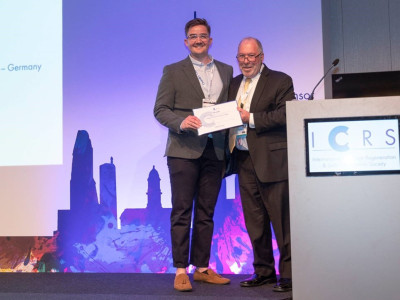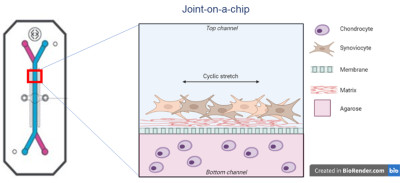News
Dr Timothy Hopkins receives Versus Arthritis Foundation Fellowship
29 July 2022


Dr Timothy Hopkins has been awarded a £310,000 Foundation Fellowship by Versus Arthritis to develop a human ‘joint-on-a-chip’. The aim of the fellowship is to improve understanding of how interactions between knee joint tissues contribute to the development of osteoarthritis (OA), and to the efficacy of treatments. OA affects approximately 8.5 million people in the UK and there is currently no cure.
Of the tissues that make up the human knee joint, Dr Hopkins is particularly interested in the interaction between the articular cartilage and the synovium. The interaction between these tissues is being increasingly implicated in the development and progression of OA, and therefore understanding this interaction would help us to understand the pathobiology of the disease. Additionally, crosstalk between the cartilage and synovium is suspected to influence patients’ individual responses to treatments for early-OA, which a proportion of patients do not respond well to. Understanding how the interaction between the cartilage and synovium contributes to treatment failure or success will allow us to develop stratified or even personalised therapies, improving quality of life for OA patients.
The joint-on-a-chip model is created by isolating cells from patients’ knee cartilage and synovium and culturing them together within a microfluidic chip to closely mimic the environment within the knee joint. By using cells from patients with different stages of OA, these disease stages can be replicated and studied in the chip. The chip system allows for the fine control of culture conditions, including the application of mechanical forces and inflammatory stimuli, and provides a range of analysis options, including effluent collection and imaging.
Earlier this year Dr Hopkins and Dr Clare Thompson were awarded a prize for their proof-of-concept work in this area at the International Cartilage Regeneration and Joint Preservation Society World Congress in Berlin. Dr Hopkins will work in Prof Martin Knight’s group in the Queen Mary+Emulate Organs-on-Chips Centre.
| People: | Timothy HOPKINS Martin KNIGHT |
| Research Centre: | Bioengineering |
Updated by: Vicky Kwaku




